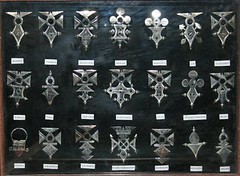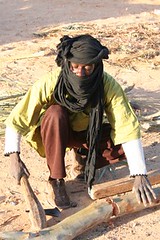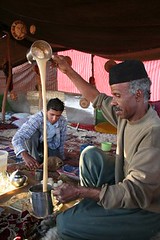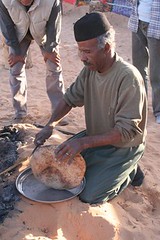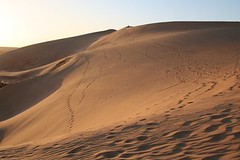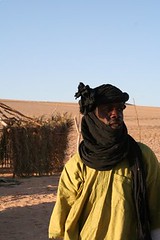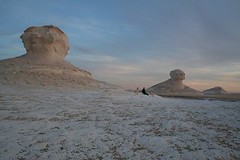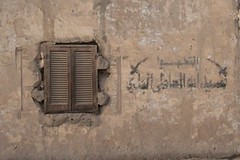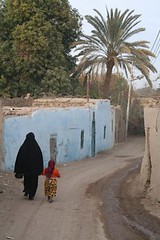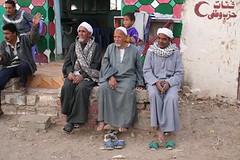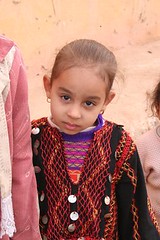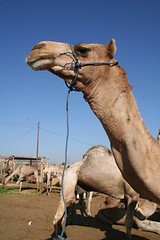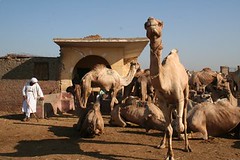Long Time No Talk
 Tuesday, January 31, 2006 at 12:45PM
Tuesday, January 31, 2006 at 12:45PM Finally I have told myself that procrastinating is only going to make things worse - I must try to catch up a bit on the last few months.
Dijanne Cevaal and her daughter Celeste are staying with me at the moment. She is here as curator for the Across Australia Quilt Show which is on in Cairo at the moment.
No - starting with now is not going to work.
I will go back to the Eid, about three weeks ago. I should know the date, but in the haze of the last few blurred and frantic weeks, I don't.
This is the Eid at the end of the pilgrimage period. All over town people are storing sheep - in courtyards, in empty apartment rooms, on roofs, in the street. Many have kept them for months in the hope of avoiding the price hike near the deadline date (and no pun was intended, but it is surprisingly appropriate). Because they are kept in a city with the area of Brisbane, but the population of Australia, there is no available food for them, and donkeys pulling carts with loads as high as a small house are seen moving through the city traffic with brilliantly green fodder piled high. It is very restful for the eyes, bright Irish green, in the dirt and dust of the greys and gingery browns of Cairo and its buildings.
On the first morning of the Eid they all die. It seemed appalling to me last year, to arrive and find fresh blood daubed in hand prints on the doors and buildings and old stone of the city. It still seems horrifying that the children who have fed and cuddled and cossetted the sheep would be willing to dip their hands in the blood to chase each other with screaming glee and daub the doors at their parents' command. It has overtones of the idea of the original passover, of avoiding plague and pestilence and all its accompanying superstition. Yet, this is a rite at the very core of Islam. The sheep are extraordinarily expensive. In a country where the average school teacher is lucky to earn 300 Egyptian pounds - about seventy five dollars Australian - a month the sheep can cost twice this each. Even more amazing is the fact that people buy them as much for others as for themselves.
One of our drivers bought a sheep for the poor in his neighbourhood because he felt himself rich in comparison - and here we would, on an Australian government salary, rate with multi millionaires. It is often called the day of meat, and for many poor Egyptians, eating meat does not happen often.
I asked how the children could join the process of killing the sheep, and it was pointed out that the animal dies for the glory of God, and it is a better death than many sheep would hope for and a glorious thing to liberate it for this reason. While I am aware that most Aussie sheep die for just the same sort of reason - to end up in a pot - it is so sanitised for us that we do not have to see our eating as depending on an animal's death. Perhaps the way here is actually better, more true and realistic.
I did not go out on the first morning of the Eid. It was a very silent morning in the streets of Zamalek. I slept late, and it was an awareness of the silence of the lambs that kept me inside. It was Monday, and on the Friday Bob and I were going to Tripoli in Libya to set up a quilt show - Across Australia - the first cultural event we have any awareness of between Libya and Australia. Our Libyan contacts were showing signs of supporting it enthusiastically. I was working on a small quilt based on Ghadarmes for the lovely man who was allowing us to use his gallery, and who had done a great deal of the organisation for us.
It started to rain - the first proper heavy rain since last March - and it was delightful working quietly in my room on the roof with soft falling rain streaming past the windows.
By evening we settled down to eat, and I turned on the TV. I was soon caught up in a chick flick, but Bob was very tired after a heavy week, and headed early to bed.
I was quite bewildered when he came in, fully dressed, and obviously wide awake, almost an hour and a half later. He usually drops into sleep with all the difficulty of a severed tree hitting the ground, and it was odd and very surprising.
As he walked in he said "There has been a terrible accident."
A bus full of Australians had crashed only forty eight kilometres from Cairo, on the slippery wet roads of the first rain of the year.
Most of you know all about this by now. As he spoke I realised that I was going to Libya alone, though it was not even mentioned for three days.
Bob worked on the phone, deploying his people so that while the consular people went straight to the public hospital that we were told people had gone to, others were going to the accident scene to try to check everyone had left and to secure belongings, and others to the hotel where the uninjured were staying. Mobile phones were unreliable at the scene, and for some reasonnot working well that night. As Bob started to get reports back from the consul and other staff he realised the scale of the accident and that – and remember this was late at night – he had to secure agreement of the hospital to shift people to a private hospital which was newer and more in keeping with western standards. The Department (Foreign Affairs and Trade) in Canberra had already set up the usual emergency response systems. When Bob was satisfied that he could do no more by phone he went to the hospital, negotiated the agreement with the hospitals to let them go while keeping their goodwill and co-operation, and supervised the loading of ambulances and making sure people’s medical records went with them.
Neither of us had any sleep, but this was a very small thing compared to the problems faced by our people.
I can’t tell you how wonderful this group was. They were mostly police, and emergency services staff on holiday with their families. Six were killed, and twenty six injured, and on the first night we were told that about six were critical. It was actually probably more. It was only by the sheer good fortune that it was such an experienced group knowing how to respond that we did not lose more people. They positioned the following bus (also part of the same tour) to light the scene as they managed to get people out of harm’s way. It was cold and bleak and slippery, and many people were terribly injured and in pain. We had experienced nurses and expert police and emergency services personnel on the tour who set up a triage system so that when the first ambulances arrived they were able to pick up those designated as most injured and take them immediately.
One lovely woman was injured when the rest of the roof of the first bus collapsed on her and crushed her when she was trying to help people caught underneath. Many men were killed, and one woman, and one child. It was a devastating loss to everyone as the group knew each other well. By morning all except one who was just too sick to move had been shifted a long way out of town to a new hospital.
I have some counselling experience and spent all the next two days with Jim Doust, interim Dean (and a truly delightful Australian) of the Episcopal Cathedral on Zamalek with people at the hotel who had survived the accident and been in the following bus, and with the patients in the hospital.
There are times when you seem almost to step beyond yourself when working, so that you see those you know well as new and amazing people. I watched my husband move through that day, in between talking to the bereaved and the desperately ill, organizing things on the phone, and all the while accompanying the senior doctor at the really excellent Dar Al Fouad Hospital to collect diagnoses to be sent back to anxious relatives and the department in Australia. He had had no sleep at all the night before and until 5.00 pm when he went home for one hour’s sleep he was unshaven, obviously exhausted, but still operating at peak ability. He even stood on the steps of the hospital and gave an off-the-cuff press interview as he knew the press needed something to send back. I cannot even tell you how proud I was of him. The whole embassy team was the same, stoic and hard working even while exhausted. Between them and the Australians at the hospital I have never been prouder of my country. One doctor said to me “These are very, very good people you have,” and I said “The Embassy?” and he said “Yes, but all the Australians here, even those who have come to help their friends”. He then gave me a very straight look, and said “I have not seen people like this before.”
It is an accolade I am proud to pass on as I agree so wholeheartedly.
On the way home from the hospital next evening (Tuesday) – around eight, Jim and I called in so he could talk to the lady still in the first hospital in intensive care. While the doctors told him she could not hear, he sat and talked to her and held her hand. I know she heard, she moved more and seemed restless. They were desperate for more blood for her. It is not an Egyptian thing to do – giving blood – and blood banks are often short. People will do it for family members having an operation, but large stocks are not held. They told us she had a rare type – and it just happened to me the same as mine. So I gave blood, went home for an hour’s sleep and came back to the hospital.
We got home that night at three – and that is the longest I have ever been without sleep. It was still hard to fall asleep. There was such terrible misery and so many strong and brave and damaged people.
Thursday I stayed home as Tabbi was flying in from Australia at the beginning of a visit. It was lovely to see her, but it was not the joyous homecoming I had hoped it would be. Friday we both went to the hospital to visit. In the afternoon we went to Libya to set up the Across Australia show.
I had intended to go straight on to telling you about it, but in fact I am weary and need a break. Talking about the hospital has stirred it all up again in my mind, and I am going to do something mindless like play FreeCell – so the Libyan exhibition will have to wait.
It will not be so long before I write next time.
